| George Washington was known as the "Father of our Country" and was unanimously elected the first President of the United States (1789-1797). He was Commander of the American forces during the Revolutionary War and helped frame the Constitution of the United States.

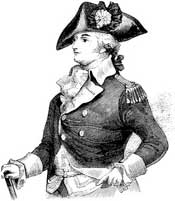 Washington was born in Westmoreland County, Virginia on February 22, 1732. His father could trace his lineage back to King Henry VIII, who initially gave Washington's family its lands and titles. Washington's early years were spent on the family estate in Pope's Creek along the Potomac River. During these years, he had basic home schooling. After his father died, Washington went to live with his half-brother, Lawrence. After his half-brother's death, Washington inherited Mount Vernon in Alexandria, Virginia. Washington was born in Westmoreland County, Virginia on February 22, 1732. His father could trace his lineage back to King Henry VIII, who initially gave Washington's family its lands and titles. Washington's early years were spent on the family estate in Pope's Creek along the Potomac River. During these years, he had basic home schooling. After his father died, Washington went to live with his half-brother, Lawrence. After his half-brother's death, Washington inherited Mount Vernon in Alexandria, Virginia.
Washington started his military career as an aide in one of Virginia's four districts. The Governor of Virginia sent him on a mission with dispatches warning the French at Fort Le Boeuf against taking more British land in the greater Ohio Valley. When Washington returned with the expected negative answer, he was named Lieutenant Colonel. As a twenty-two-year-old, Washington won acknowledgement in the French and Indian War (1754-63). By the time he was 23, Washington had become a full colonel and was appointed Commander and Chief of the Virginia Militia. He became known for his written accounts of military situations from recruiting to desertion.
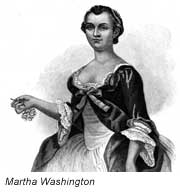
In 1758, Washington returned to Virginia where he renovated Mount Vernon and married a widow with two children. His marriage to Martha Dandridge Custis was a fruitful and happy union. From 1759-1774, he served in the Virginia House of Burgesses. It was during this time that the colonies started to have serious problems with England. Washington became a delegate to the Continental Congress of 1774-75, where he functioned as a peacemaker and politician. By June of 1775, Washington was the unanimous choice for Commander in Chief of the Continental Army.

During the Revolutionary War, performed honorably, known especially for his perseverance. After his famous crossing of the Delaware River, he surprised the British in Trenton and forced them out of Trenton. He then led another successful attack against the British in Princeton, New Jersey. Washington's victories encouraged 8,000 men to join the Continental Army. Even though his army grew in size, Howe defeated Washington at Brandywine Creek and again at Germantown. These reversals forced Washington to retreat to Valley Forge, where his army spent a long, hard winter.
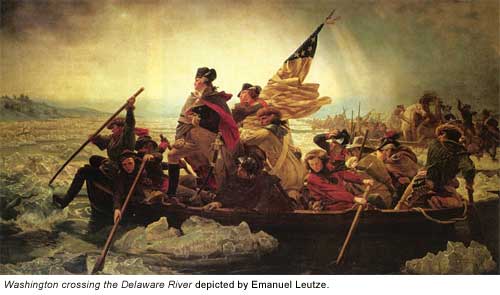
During the difficult winter, the Continental Congress grew tired of Washington's constant requests for supplies. Because of this, he reached out to France for troops and supplies. In the spring of 1778 good news came; France decided to send money, troops, and a fleet. With the support of the French, Washington's mainly untrained and untested forces eventually went on to defeat the British. He led his forces to victory at the Battle of Yorktown, Virginia. This was the decisive battle of the American Revolution. Lord Cornwallis surrendered on October 19, 1781.
After the American Revolution, an armed revolt in Massachusetts made it apparent that a stronger government was needed. The Constitutional Convention was held to deal with the problem. Washington was chosen president of the convention and he played an important role in getting the Constitution ratified.

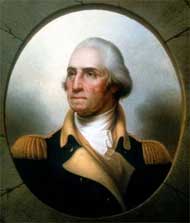 After the Constitution was ratified, Washington unanimously won the presidential election and took the oath of office in New York on April 30, 1789. At the time he was elected President, there were no established political parties in the United States. During Washington's first term, the White House was built, but he was the only President who never lived there. A two party political system was created because of a disagreement between Washington and Thomas Jefferson regarding the support of France during the French and English War. After the Constitution was ratified, Washington unanimously won the presidential election and took the oath of office in New York on April 30, 1789. At the time he was elected President, there were no established political parties in the United States. During Washington's first term, the White House was built, but he was the only President who never lived there. A two party political system was created because of a disagreement between Washington and Thomas Jefferson regarding the support of France during the French and English War.
Washington was unanimously reelected in 1793. During his first term he had appointed Alexander Hamilton as Secretary of Treasury. During his second term, Hamilton sponsored a tax on Whiskey. Irate grain farmers, who considered the tax an attack upon their liberty, revolted in what was called the Whiskey Rebellion. Washington called out 15,000 members of a nearby militia and quickly put the rebellion down. He successfully met the first real test of the federal government's rights and powers.
After serving eight years as President of the United States, Washington grew tired of political battles. He declined to run for a third term. He chose to retire to his beloved Mount Vernon.

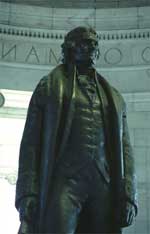 Historically Washington is a much-loved figure. Eulogizing Washington after his death on December 14, 1799, Richard Henry Lee of Virginia praised him as "First in war, first in peace, and first in the hearts of his countrymen." Historically Washington is a much-loved figure. Eulogizing Washington after his death on December 14, 1799, Richard Henry Lee of Virginia praised him as "First in war, first in peace, and first in the hearts of his countrymen."
George Washington's portrait can be found on both the American quarter and the one-dollar bill. His legendary false teeth have been on display in our nation's capital. The capital of the United States is named after him. We still celebrate his birthday, a tradition that was started as a tribute to him soon after his death. Since Abraham Lincoln's birthday was in the same month, the two birthdays are now celebrated together on the third Monday of February, which is called Presidents' Day.
|

